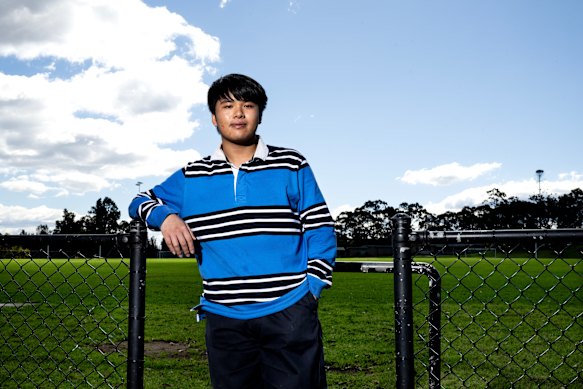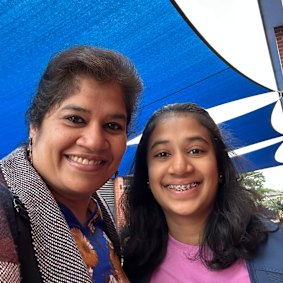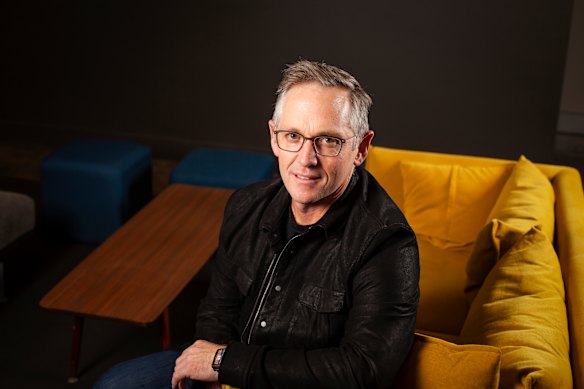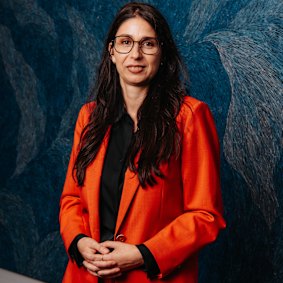“AI is making it much harder for juniors to compete,” says Sarah Moran.
Loading
Moran is the chief operating officer of AI start-up PatientNotes. She is also the co-founder of Girl Geek Academy, a movement to bring 1 million women and girls into technology careers by 2030.
“The junior developers still far outperform AI, but the situation is creating a catch-22. How do juniors develop their skills if they can’t get hired in the first place? Career development typically happens on the job, with mentoring and real-world experience, yet tech companies prefer to hire senior developers, leaving graduates struggling to break in.”
Moran runs regular workshops for high school students on AI and one of those students, 14-year-old Zoya Faruqui, is choosing to remain optimistic.
“I feel like learning about tech is a good thing, I don’t think it goes to waste,” she says. “To make AI and robots you need people. Some simple jobs might be replaced, but there will be new jobs created to work with AI and make sure it’s used in the right way.”
Jayden Nguyen, who is set to complete his computer science degree at UNSW later this year, agrees with Faruqui. After completing a three-month paid internship at Canva over the summer, he’s secured a graduate role at a big tech firm.

UNSW computer science student Jayden Nguyen has secured a graduate role at a big tech firm. He says students will have to start building their industry experience earlier as AI eliminates “grunt coders”.Credit: Louise Kennerley
“AI is automating the grunt coders, the ones who code without thinking as much. But AI can’t replace people who work to build things, synthesise stuff together,” says the 22-year-old, who took on a teaching assistant role while studying in part to demonstrate to employers how he can communicate technical concepts clearly.
Nguyen says in his experience, AI can effectively generate a general solution, but it struggles to link working parts of code together to form the intricate networks needed for scalable systems, and nail specific requests. He also says it doesn’t have the “intimate cybersecurity knowledge” required to understand how to make code more secure.
“There’s more to software engineering, more to developer tech roles than just churning out code,” says Nguyen. ”It’s still a really good tool. It definitely makes people faster … it’s just, you still need a lot of [critical] thinking [skills].”

High school stuident Zoya Faruqui, pictured with her mother Kavitha, is keen on a future career in technology.
Critical thinking skills, however, are only some of the qualities candidates for entry-level roles will have to already have finessed before applying. With AI eliminating the need for “grunt coders”, graduates will need more than technical skills to stand out in the recruitment process, which is only getting more competitive.
The numbers: a market cooling fast
Some of the statistics make for grim reading for young people like Faruqui, whom Nguyen says will need to start looking to get industry experience, such as internships, hackathons or extra certifications, earlier on in their degrees. The overall pipeline for entry-level positions seems to be shrinking.
According to Indeed, job postings targeted at graduates across all sectors in Australia are down 15 per cent in 2025, following a 24 per cent drop in 2024.
Loading
“It’s still healthier than pre-pandemic levels – about 50 per cent above where they were in 2019 – but over the past two years the trend is downward,” says Indeed Australia senior economist Callam Pickering.
Pickering cautions against blaming AI alone. He says what we’re really seeing is a softer economic environment overall. White-collar graduate opportunities are moving almost in lockstep with apprenticeships in plumbing, childcare and hairdressing.
“Generative AI is pretty useless for most of the roles that require an apprenticeship,” he says. “I think the graduate market is operating very similar to the overall job market.”
Still, AI’s fingerprints are showing up. In July, 4.1 per cent of Australian job ads mentioned AI – nearly double last year’s figure.
What roles might be “AI-proof”? LinkedIn’s Jobs on the Rise 2025 report offers clues. It lists the top five fastest-growing roles in Australia: English teacher, travel specialist, sommelier, server, and electrical engineer.
Hospitality and travel roles have also surged post-pandemic, reflecting pent-up demand. Teaching is booming too, buoyed by international students and global demand for English. Cybersecurity also remains one of the hottest fields.
Early roles shifting, but not vanishing
Amid some bleak broader numbers, Australia’s tech giants insist that their doors are open to juniors, and the Tech Council of Australia says ChatGPT’s launch hasn’t yet impacted graduate outcomes. Enterprise software maker Atlassian has just hired 108 graduates to commence in February 2026, and says it expects to hire a similar number in 2027. Canva too says it’s still hiring graduates and junior engineers.
Canva, which makes online design software, has been one of the most aggressive adopters of AI but chief technology officer Brendan Humphreys is adamant that coding is still a valuable skill.
“Fresh perspectives and early career talent are vital in tech, and the AI boom doesn’t change that,” he says. “That said, the shape of early career roles is evolving. Entry-level coders will increasingly find themselves working alongside AI tools, which means success will be less about writing code line by line and more about understanding systems, solving problems, and critically assessing the output of those tools.
“The demand for human judgment – to guide, verify, and integrate AI into real products – is not going away.”
‘The software engineers of the future will be conductors, not musicians. They’ll orchestrate AI performance rather than write code line by line.’
Alyse Sue, PALO IT lead architect
Alyse Sue has been a software engineer at numerous start-ups and is now lead architect for global tech consulting company PALO IT. She’s based in Singapore and says anecdotally, she’s seeing tech companies quietly cutting junior engineers and replacing them with AI tools.
Modern AI models like GPT-5, Claude and Llama can generate code in hundreds of languages – even obscure ones – and are particularly adept at data analysis, website design and automation.
“For us, we’re moving towards a model where 95 per cent of coding work is done by AI tools like GitHub Copilot, and our engineers are responsible for working alongside AI to ensure everything works as it should,” Sue says.
“The software engineers of the future will be conductors, not musicians. They’ll orchestrate AI performance rather than write code line by line. Rather than hiring junior programmers working on isolated code, companies will focus on developers who can understand entire systems and how they work together.”

Hugh Williams has led engineering at some of the world’s most successful tech companies. He also invented infinite scroll.Credit: Eamon Gallagher
Hugh Williams is not a recent graduate. Williams has held the most senior engineering position that any Australian has held at a big tech company: he was a vice president of engineering at Google where he managed more than 1000 engineers for Google Maps. He left Silicon Valley to tackle STEM literacy in Australia, founding Code for Schools in 2017, a program that has now reached more than 200,000 students nationally.

Associate Professor Sandra Peter compares AI to teenage sex: “Everyone’s talking about it. Everyone thinks everyone else is doing it. Few are getting it right. And there are safety issues. Education can really help.”Credit: SMH
He rails against the idea that the need for coding skills will go away, and says that a computer science degree is still worth its weight in gold. And his favourite analogy when talking about AI? Power tools.
“These new AI tools are like power tools for carpenters,” he says. “They’re far more productive than getting out the hammer and chisel. But not every man or woman can suddenly build a skyscraper or a bridge.
“People are getting a bit confused. Everybody at home can now use AI to vibe code an app, but that app is never going to scale, it’s not going to be safe or secure, and it’s not going to make it to the global stage. It’s a toy. And that’s what’s getting lost here.”
Dr Sandra Peter, director of Sydney Executive Plus and associate professor at the University of Sydney’s Business School, deploys a different analogy for AI: teenage sex.
“Everyone’s talking about it,” she says. “Everyone thinks everyone else is doing it. Few are getting it right. And there are safety issues. Education can really help.”
The AI paradox
The irony is that AI could be both a job-creator and job-killer.
“We should be taking [AI] very seriously … but possibly not in the sense of it being a threat [to our jobs],” says Professor Janine Dixon, director of the Centre of Policy Studies at Victoria University.
Dixon helped model AI’s labour market impact for Jobs and Skills Australia, and says AI is “a new technology that we need to master”.
Her findings are sobering but not apocalyptic. In her simulation, technology eventually replaced around a third of all jobs. But unemployment rose only two percentage points, largely because the change happens gradually, and because new roles emerge in tandem.
She compares it to when ATMs replaced bank tellers.
“Obviously people who had been bank tellers, a lot of them lost their jobs and had to retrain. And it was disruptive to them. But they’re not still unemployed today.”
Loading
Dixon and others see “AI literacy” as the next universal skill – comparable to learning to read, or to the digital literacy wave that swept the 1990s. LinkedIn’s data backs this up: AI literacy is on the list of fastest-growing skills in Australia.
The hardest challenge may not be for today’s graduates but instead their leaders, who have to grapple with how to balance headcount, AI, human experience and productivity.
“Maybe I’m being critical of my generation who are still running the world,” says Williams, the former Google and Microsoft executive. “But they can have a very old-school way of thinking. They say, ‘I want more AI roles’, then they’ll make up new job titles for people who can come into their company.
“What they need to be saying is ‘let’s bring in bright young people who want to change the world’. One of the fabulous qualities of graduates is that they will come in and operate that way regardless of the title that you give them. Just remove as many barriers as possible and let them disrupt in an interesting way.”
Where to next?
Ultimately, what advice should anxious parents be giving their kids, if they’re keen on a career in technology?
Moran says it’s important for parents to use AI tools themselves so they can help their kids understand how it works.
“I know many parents don’t fully understand AI themselves. But here’s the thing, that doesn’t matter. You don’t need to be an expert to teach someone,” she says. “You just need to stay one step ahead of the person you’re teaching.”
For both students and their parents, Williams’ advice is simple.
“Learn the fundamentals of computer science. And if you don’t do that at school, consider it at university. Not only will you become a great problem solver, you will create the next generation of these tools that are changing the world.”
Start the day with a summary of the day’s most important and interesting stories, analysis and insights. Sign up for our Morning Edition newsletter.

